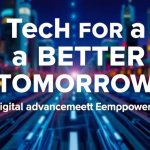The rapid advancement of technology has shaped human civilization for centuries, but in the 21st century, digital evolution is transforming work, life, and society at an unprecedented pace. From artificial intelligence to blockchain, from the gig economy to smart cities, technology is redefining how we live and interact. This article explores how these advancements will continue to shape the future, bringing both opportunities and challenges.
The Transformation of Work
Automation and AI in the Workforce
Artificial intelligence (AI) and automation are revolutionizing industries by improving efficiency and reducing costs. AI-powered systems can handle complex tasks such as data analysis, customer service, and even medical diagnoses. As machines become more capable, traditional job roles will evolve, requiring workers to develop new skills.
While automation threatens to displace some jobs, it also creates new employment opportunities. For instance, AI development, cybersecurity, and robotics engineering are among the fastest-growing fields. Companies must invest in employee reskilling programs to ensure the workforce remains adaptable.
The Rise of Remote and Hybrid Work
The COVID-19 pandemic accelerated the adoption of remote work, and its benefits have led many companies to continue offering flexible work arrangements. Cloud computing, video conferencing, and collaboration tools like Slack and Zoom have made it possible to work from virtually anywhere.
Remote work offers advantages such as reduced commuting time, increased productivity, and a better work-life balance. However, it also presents challenges, including isolation, cybersecurity risks, and blurred boundaries between professional and personal life. The future of work will likely see a hybrid model where employees split their time between home and office, requiring businesses to adapt their policies and infrastructure.
The Gig Economy and Digital Freelancing
The rise of gig platforms like Uber, Upwork, and Fiverr has enabled more people to work on a flexible basis. The gig economy provides workers with autonomy, allowing them to choose projects and set their own schedules. However, it also raises concerns about job security, benefits, and fair wages.
To address these issues, governments and organizations must establish regulations that ensure fair treatment and social protections for gig workers. The digital economy will continue expanding, and businesses must find ways to balance flexibility with stability.
The Digitalization of Daily Life
Smart Homes and IoT
The Internet of Things (IoT) is integrating technology into our homes, making daily tasks more convenient. Smart assistants like Amazon Alexa and Google Home can control lighting, security systems, and appliances with voice commands. IoT-enabled devices, such as smart refrigerators and thermostats, optimize energy usage and improve efficiency.
As smart home technology advances, concerns about data privacy and cybersecurity must be addressed. Companies need to implement stronger encryption and user protections to ensure that digital convenience does not come at the cost of personal security.
Digital Health and Telemedicine
Healthcare is undergoing a digital revolution, with telemedicine, wearable health monitors, and AI-driven diagnostics enhancing patient care. Telehealth platforms allow patients to consult doctors remotely, reducing the burden on hospitals and increasing accessibility.
Wearable devices, like Fitbit and Apple Watch, track vital signs and alert users to potential health risks. AI-powered medical tools assist in diagnosing diseases more accurately and quickly than traditional methods. As digital health solutions become more widespread, regulatory frameworks must be updated to ensure patient data security and equitable access to healthcare.
The Metaverse and Virtual Interaction
The concept of the metaverse—an interconnected virtual world where people can work, socialize, and play—has gained momentum. Companies like Meta (formerly Facebook) and Microsoft are investing heavily in virtual and augmented reality (VR/AR) technologies.
The metaverse has the potential to revolutionize entertainment, education, and business. Virtual meetings, digital classrooms, and immersive gaming experiences are already becoming a reality. However, concerns about digital addiction, identity fraud, and privacy will need to be addressed as these technologies become more prevalent.
The Societal Impact of Digital Evolution
Education in the Digital Age
Education has been significantly impacted by digital transformation. Online learning platforms like Coursera, Udemy, and Khan Academy provide access to knowledge from anywhere in the world. AI-driven personalized learning tools adapt to individual student needs, enhancing the educational experience.
However, the digital divide remains a challenge. Not all students have equal access to high-speed internet or modern devices. Governments and organizations must invest in digital infrastructure and policies that ensure equitable access to education for all.
Ethical and Privacy Concerns
With increasing reliance on digital technologies, ethical dilemmas regarding data privacy and surveillance have emerged. Social media platforms, search engines, and smart devices collect vast amounts of personal data, raising concerns about how this information is used.
Regulations such as the General Data Protection Regulation (GDPR) in Europe set guidelines for data privacy, but continuous efforts are needed to keep up with technological advancements. Users must also be educated about digital literacy and the importance of protecting their personal information.
Climate Change and Green Tech
Technology is playing a crucial role in addressing climate change. Renewable energy sources, smart grids, and AI-driven climate models are helping to reduce carbon footprints and optimize resource management.
Electric vehicles (EVs), sustainable supply chains, and eco-friendly urban planning are paving the way for a greener future. Companies must prioritize sustainability by adopting environmentally friendly technologies and reducing e-waste.
Conclusion
Digital evolution is reshaping work, life, and society in profound ways. While technological advancements bring tremendous benefits, they also pose challenges that require thoughtful regulation, ethical considerations, and continuous adaptation. The future will belong to those who can harness technology to improve efficiency, enhance quality of life, and build a more equitable and sustainable world. By embracing digital transformation responsibly, humanity can ensure that the benefits of technology are accessible to all, creating a brighter future for generations to come.







Leave a Reply